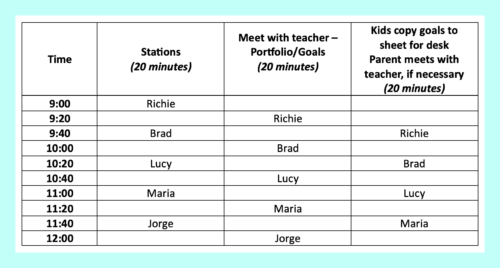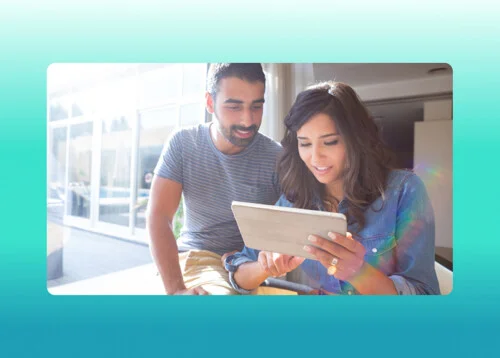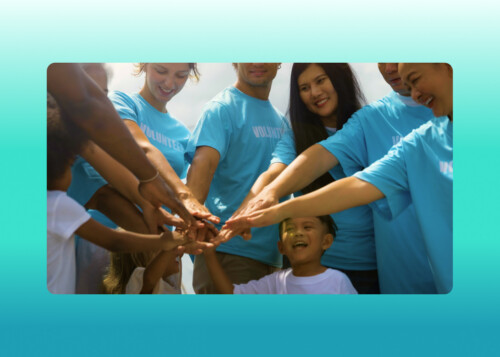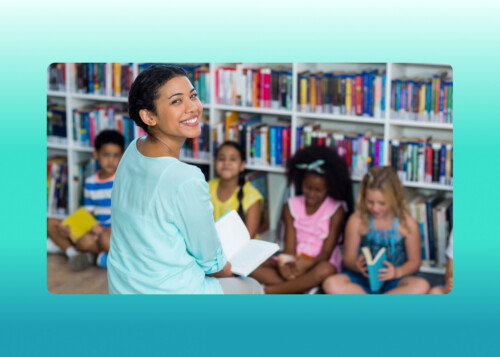Reflecting on her 43 years of experience as a teacher, Dorothy L. Dobson shares her journey to what led her to host student-led conferences and how the conference style positively connected the teacher, parents, and children. While student-led conferences undoubtedly create more work than the traditional style, Mrs. Dobson makes a strong case for this model that includes everyone.
She writes, “I watched parents truly understand what their kids did all day – what expectations were placed on them regularly, how hard they worked to achieve those expectations, and how they felt about their results.” Let’s dive in!
Waiting on the Bench
I remember it so well, like it was yesterday, really. I was sitting on the bench by the kickball diamond. It was the bench we sat on while waiting for our turn to kick – our turn to live in glory or hang our heads in embarrassment.
But the playground was empty that day, and I sat alone on the bench. My eyes were glued to the door of Room 10. And even though it wasn’t kickball, I unquestionably felt as if I was waiting for glory or shame. My mom was inside Room 10, which was unusual because inside Room 10 was MY place. Room 10 was my fourth-grade classroom.
Things hadn’t been easy around home. My oldest sister had gotten married without any of us being there. That hurt, and everyone around me seemed to think I was too young to understand. That hurt, too. I guess I knew that I hadn’t been acting the same. I didn’t know why, and I obviously didn’t know what to do about it. I DID know that my mom and Mrs. Ernst were probably talking about it. And, once again, I was not a part of the conversation. I was “too young.”
You know what’s strange? I don’t remember the rest of the day. I can see my mom emerge from Room 10, and the memory goes blank. I have pieced together a bit – when I look at my fourth-grade report card, there is one marking period with an “N” for “Needs Improvement” in “Self-Control.” Ugh. I hope I didn’t embarrass myself or my family. I wish I could tell you what I had done to “earn” that “N,” but I have no Idea.
More Than a Conference
You know what I DO remember and can tell you? I wanted to be in that room. I seriously wanted to be in that room. The memory of this event and my feelings surrounding it impacted my teaching from the beginning of my career.
Students needed to be a part of Parent Conferences. The conferences needed to be a PART of a child’s education – not something where the child sat across the playground wondering what was being said about them.
Conferences needed to be another teaching opportunity for direct feedback to the child, for the parent to understand what they could do to help the teacher and child, and for the teacher to observe the parent/child interaction. Conferences needed to be an opportunity for the students to share what they recognized as needs and perceived as “glories.”
A Seat at the Table
My third graders at Webster Elementary were invited to come to their conferences. Luckily, I worked for a principal who was willing to let me try almost anything (within reason, of course). So, when I sent the note home about conferences, I invited the kids. I know the parents were concerned but mildly comforted by my assurance that we (as the adults) reserved the privilege to ask the kids to leave the room if necessary. I don’t remember anyone using that opportunity.
I was sold. The kids seemed to take more ownership of their learning and become more aware of progress and grades. I did what smart people do when something works – I kept doing it! With tweaks and with time, I started turning more and more of the leadership over to the kids. The kids rose to the occasion every time, and conferences became more meaningful for every member of the triad team of students, educators, and parents.
I kept tweaking as I went. I began by simply inviting the kids to come. I continued to be “in charge,” but the kids were there to help create goals and tell their “side of the story” if it needed to be heard.
The school where I taught started calling Parent Conferences “Student Educator Parent” conferences. I liked it! It indicated what I felt in my heart – students needed to be part of the team. It was their education, after all.
As I said, the students had slowly taken more responsibility for their conferences. I was still preparing the majority of the materials. The kids showed the prepared materials to their parents and made goals based on those materials. I was still “in charge.” Although the kids weren’t sitting across the playground on a kickball bench, it still wasn’t THEIR conference, either.
From Conferences to Conversations
I went deeper. I knew there had to be more. I found an article describing a lower-grade classroom where the students and parents visited several “stations” within the classroom. At each station, the kids explained what they were learning, and the parents had the opportunity to experience the learning with them. I tried it, and it was incredible!
I watched parents truly understand what their kids did all day – what expectations were placed on them regularly, how hard they worked to achieve those expectations, and how they felt about their results.
Although time-consuming and challenging, preparation became fun with lots of input from my students for the stations they would create. It was heartwarming to see kids and parents laughing as they did a simple science experiment or practiced a yoga pose we had learned in P.E. The kids could spend one-on-one time reading their stories to parents or talking about what they could do to memorize their math facts FINALLY.
I knew, though, that I needed to be more involved in goal setting. I started meeting with kids to make five or six goals ahead of time that they would then narrow down to two or three with their parent’s input. Preparation had become even more challenging, but the days of the conferences were great fun!
Real Talk, Real Work
My last five years of teaching were at a school that was part of the EL Education (formerly Expeditionary Learning) family. EL Education firmly believes in student-led conferences and teaching students to be “leaders of their ownlearning.” Portfolios are also a significant part of the organization’s educational process.
Student-led Conferences consist of students and parents looking at assignments and projects and students explaining their thoughts on their work. Often, the assignments are viewed in steps taken: how they started, middle versions, and a finished product. This serious method, even though it doesn’t involve the fun inherent in the stations mentioned above, is also quite a jump from the traditional conferences I grew up with.
It began to feel like no way was the “right” way. Many parents wanted time to meet one-on-one with the teacher. The kids weren’t getting the one-on-one laughter and learning time with their parents. I continued to prepare wholly but didn’t enjoy the conferences themselves. I shouldn’t say that – I always enjoyed talking to my kids and their parents, but it wasn’t quite the same.
Where Joy Meets Rigor
If I had it to do today, I would create a hybrid. I would be able to, with the kids’ help, schedule 2 conferences per hour. Each conference would last an hour, but it would be a more strictly organized hour. The table below illustrates what I believe I would try.
This schedule would be PACKED for the teacher. If the parent sees no need for a private meeting, this could, of course, be shortened. The teacher could divide conference days into different schedules if the parents’ desires for a private meeting were known beforehand.
No One Left on the Playground
It would be worth a try. This schedule would provide the joy of the stations, the rigor for students to look at and self-evaluate the portfolio work, and the opportunity for parents to request a private meeting. And the absolute assurance that no child was left sitting across the playground, wondering what was happening in “the room where it happens.”
Insightful Videos on Student-Led Conferences
- Why I Undoubtedly Think Student-Led Conferences Is the New Model - April 15, 2025
- How To Inspire Better Learning Through Curriculum Integration - January 19, 2025
- Advice to a New Teacher: There are Ten Things You Need to Know - November 22, 2024





